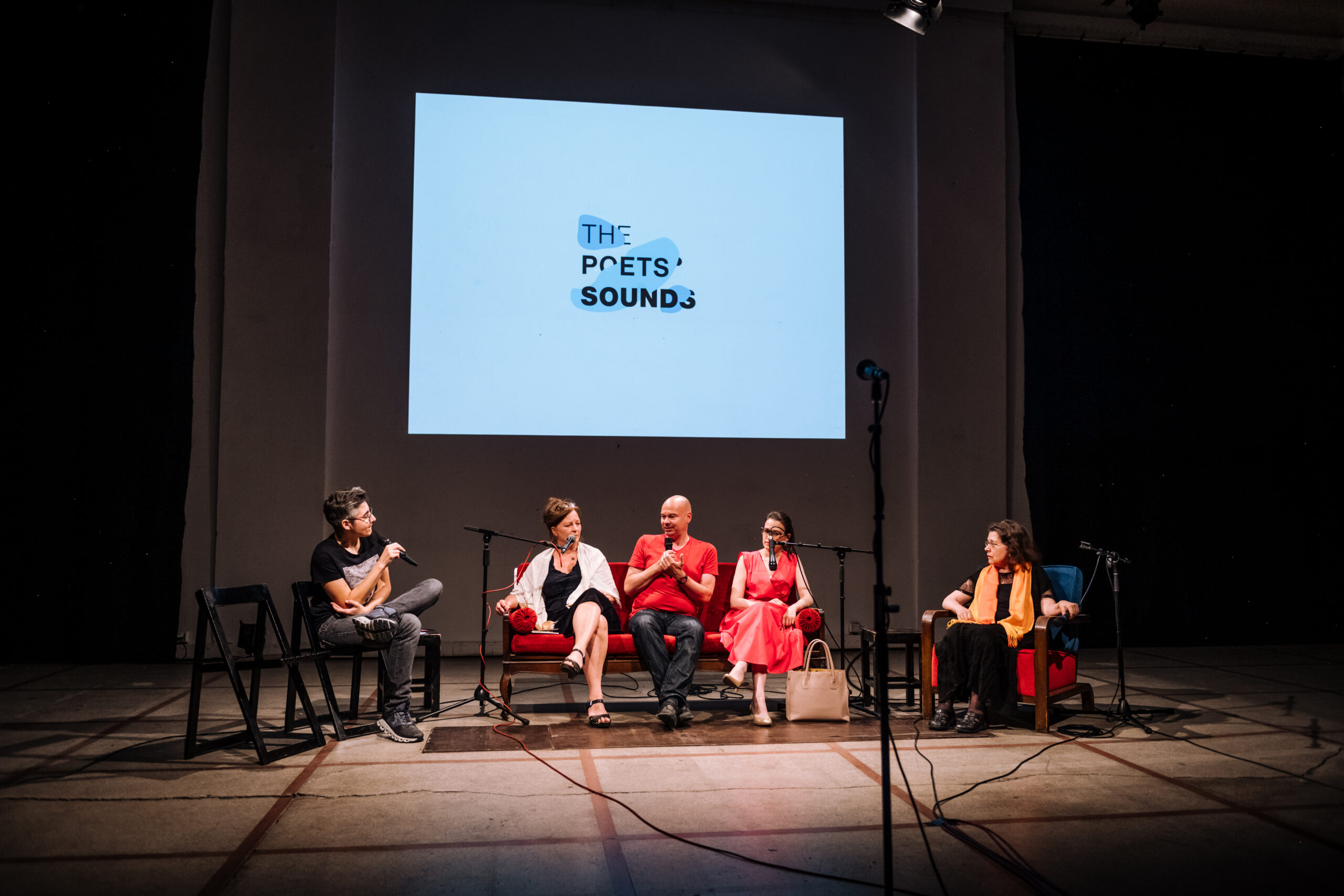
19 Jul Poetry is a reminder of the very origin of language, and the origin of language is in the sound and feelings / Report from the third evening of the KROKODIL Festival
As part of the programme of the third evening of the 14th Krokodil Festival, which took place at the Centre for Cultural Decontamination, the audience met the artists from the projects CELA (Connecting Emerging Literary Artist) and The Poets Sounds, realised in cooperation with Lettretage from Berlin. As on the previous festival evenings, the programme was hosted by the incredible Mima Simić.
The evening opened with Mima Simić and Florian Neuner chatting to the German speech art trio Sprechbohrer, comprised of Georg Sachse, Sigrid Sachse and Harald Muenz. Mima recalled the night when she first saw this talented trio perform in Berlin. She revealed that she was not a big fan of poetry unless it was the lyrics of Britney Spears’ songs. However, she was utterly amazed by the trio’s excellent performance in Berlin. It was even better than Britney Spears herself, Mima admitted, laughing.
The programme continued with the performances by Lisa Weeda and Bojana Budimir, Arianna Bonazzi and Ana Popović, and Andraž Rožman and Jelena Dedeić, from the CELA project. The main aim of this project is to put translators on the same level as authors, as equal literary creators.
The first pair, Arianna and Ana, talked to Mima about their mutual trust and how important their relationship really was, because the translator would often improve the original text. ‘Ana is my favourite’, Arianna declared, and their bond was evident in their performance.
Andraž Rožman and Jelena Dedeić performed an excerpt from Rožman’s book Tito’s Son. The concept helps convey a dose of craziness and charge in the best possible way. ‘Crazy are those who tell the truth’, the author said to Mima.
The last pair, Lisa and Bojana, dressed in black in order to convey the mood of the text, pointed out that creative effort comes from a charge. The impression is that they are almost the same, and their reading the text simultaneously just adds to it. ‘Flemish is an erotic version of Dutch’, and the accent plays a big part, Mima’s interlocutors agree.
In the second half of the evening, the audience enjoyed the performances of artists Tone Avenstroup from Norway, Miia Toivio from Finland and Katalin Ladik, whom they already know and love. Katalin Ladik is a Hungarian poet, actress and performance artist. She was born in Novi Sad, where she has lived and created for decades. With her original and often provocative art, she became one of the most important names in the Novi Sad art scene in the second half of the 20th century. Although Katalin will turn 80 this year, her incredible energy on the stage has not dissipated. The audience rewarded the performance of this legendary artist with a standing ovation. The artists from Norway and Finland maintained the exuberance with their performances and then had a chat with Mima and Florian.
Talking about the diversity of languages that the artists used that evening, Mima asked the poets how important it was for them that the audience understood their poetry, ie if it was crucial that the meaning reached the audience. Miia Toivio decidedly answered that it did not matter to her if the audience understood the semantics of her poems or not:
‘When we really think about language, the meaning is not so important. It’s all about the sound. It is the sound that carries the meaning. It would be very problematic if the audience, listening to my poetry, were to get stuck on meaning because then they would miss out on the key thing that is conveyed in contact with poetry. Poetry is not the same as speech because when we think about the speech we focus on its function in communication. Poetry, on the other hand, is a reminder of the origins of language itself. And the origin of language is in the sound and feelings.”
The programme was concluded with a performance by the speech art trio Sprechbohrer. The audience was delighted by their performance of the works by Katalin Ladik, Edouard Escoffet, Elisabeth Wandeler-Deck and others. This original group of artists is all about experimenting with the boundaries of music, phonetics and literature.
Written by: Ana Stanković and Sanja Urošević, Krokodil’s Journalists for a Day.
The project Journalist for a Day – Journalists against Racism is implemented as part of Reporting Diversity Network 2.0 funded by the European Union.



Sorry, the comment form is closed at this time.